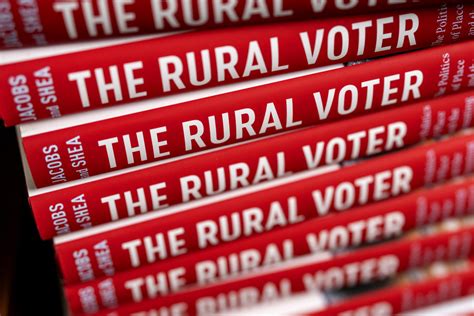The Rural Voter

In the intricate landscape of politics, the influence of rural voters often emerges as a pivotal force, shaping the course of elections and policy-making. This segment of the electorate, while sometimes overlooked, wields significant power that extends far beyond the confines of their communities. Delving into the unique characteristics, voting patterns, and societal implications of rural voters is essential for a comprehensive understanding of modern politics.
This in-depth exploration aims to shed light on the complexities of rural voting, offering a nuanced perspective that goes beyond the stereotypes often associated with this demographic. By analyzing their motivations, preferences, and the broader impact they have on the political arena, we can gain valuable insights into the dynamics that shape our political systems.
The Rural Electorate: A Diverse and Complex Demographic

Defining rural voters as a homogenous group would be an oversimplification. This demographic encompasses a diverse range of individuals, each with their own set of beliefs, values, and priorities. From the farmers tilling the land to the small business owners running local shops, and from the elderly residents with decades of life experience to the youth eager for change, the rural electorate is a tapestry of varied identities and perspectives.
One of the key characteristics of rural voters is their strong sense of community and tradition. They often have deep roots in their regions, with families that have lived and worked in the same areas for generations. This attachment to place and history shapes their views on a range of issues, from land use and conservation to economic development and social policies.
| Demographic Category | Key Characteristics |
|---|---|
| Age Distribution | Older voters are more prevalent, with a median age often higher than urban areas. This can influence policy preferences, with older voters prioritizing issues like healthcare and social security. |
| Economic Factors | Many rural residents depend on agriculture, natural resource industries, or small businesses. Economic policies that support these sectors often resonate strongly with this demographic. |
| Social Values | Rural communities often value tradition, family, and religious beliefs. Social issues such as marriage equality, abortion, and gun rights can be significant factors in their voting decisions. |
| Educational Attainment | While rural areas vary, some regions have lower educational attainment rates. This can impact the types of information sources they rely on and their understanding of political issues. |

Rural Voters and Political Engagement
Despite their diverse nature, rural voters often share a common thread when it comes to political engagement. They tend to be highly informed about local issues and have a strong sense of civic duty. This translates into active participation in local elections and a keen interest in understanding the implications of national policies on their communities.
However, when it comes to national elections, the picture can be more complex. Rural voters are not a monolithic bloc; their voting behavior can vary significantly based on a range of factors, including party affiliation, candidate charisma, and specific policy platforms.
Voting Patterns and Political Preferences

Understanding the voting patterns of rural voters is crucial for predicting election outcomes and crafting effective political strategies. While rural areas have historically leaned towards conservative parties, this trend is not universal or static.
Conservative Leanings and Beyond
The inclination towards conservative parties among rural voters is often attributed to their traditional values, economic interests, and a perceived alignment with specific policies. For instance, rural voters often prioritize issues like gun rights, small government, and economic policies that support local industries. These factors can make conservative parties more appealing to this demographic.
However, it is essential to recognize that rural voters are not exclusively conservative. The rise of progressive movements in rural areas, particularly among younger generations, challenges the notion of a uniformly conservative rural electorate. Issues like climate change, healthcare accessibility, and social justice are increasingly gaining traction among rural voters, leading to a more diverse political landscape.
The Impact of Candidates and Campaigns
The personal qualities and policies of candidates can significantly influence the voting decisions of rural residents. Charismatic leaders who demonstrate a genuine understanding of rural issues and present concrete solutions often resonate strongly with this demographic. Additionally, candidates who prioritize rural outreach and engagement can gain a strategic advantage, as this segment of voters appreciates being seen and heard.
Campaign strategies that focus on grassroots organizing, community events, and door-to-door engagement are particularly effective in rural areas. These methods allow candidates to connect personally with voters, understand their concerns, and demonstrate their commitment to representing rural interests.
The Role of Media and Information Sources
Media consumption patterns among rural voters can also influence their political preferences. With limited access to diverse media outlets in some rural areas, local news sources and community-based media often play a significant role in shaping public opinion. This highlights the importance of local journalism and the need for accurate, balanced reporting to ensure rural voters are well-informed.
Furthermore, the rise of digital media has provided rural voters with increased access to a variety of information sources. While this expansion can lead to a more informed electorate, it also presents challenges in navigating the abundance of information and discerning reliable sources.
The Impact of Rural Voters on Policy and Governance
The influence of rural voters extends far beyond their voting behavior. Their priorities and perspectives significantly shape policy agendas and governance structures, both locally and nationally.
Local Governance and Community Development
In local governance, rural voters often prioritize issues related to community development, infrastructure, and economic diversification. They play a crucial role in decision-making processes, influencing policies that impact their daily lives, such as access to healthcare, education, and transportation.
Furthermore, rural voters' involvement in local governance fosters a sense of ownership and responsibility for community well-being. This active participation can lead to innovative solutions tailored to the unique challenges and opportunities of rural areas.
National Policy Priorities
On a national level, rural voters' influence is most prominently seen in policy areas that directly impact their livelihoods and communities. For instance, agricultural policies, rural healthcare initiatives, and infrastructure development plans often reflect the priorities and needs of this demographic.
Additionally, rural voters can be influential in shaping broader social and cultural policies. Their perspectives on issues like immigration, racial justice, and environmental conservation can inform national conversations and policy directions.
Challenges and Opportunities
Despite their significant influence, rural voters face unique challenges. These include limited access to resources, infrastructure gaps, and a perceived lack of representation in urban-centric political landscapes. Addressing these challenges is essential to ensuring that rural voters' voices are heard and their needs are met.
However, the opportunities presented by rural voters are immense. Their deep connection to their communities, strong sense of tradition, and commitment to civic engagement offer a wealth of knowledge and insights that can enrich political discourse and policy-making processes. By engaging with and understanding rural voters, policymakers can develop more effective and inclusive strategies that benefit all segments of society.
Conclusion: The Power of Rural Voters
In conclusion, the rural voter is a powerful force in the political landscape, with a unique set of characteristics, preferences, and priorities that shape elections and policy-making. Their influence extends far beyond the confines of rural communities, impacting the broader societal narrative and the direction of governance.
By understanding and engaging with rural voters, policymakers, candidates, and the broader public can foster a more inclusive and representative political system. This involves recognizing the diversity within the rural electorate, respecting their values and traditions, and actively addressing the challenges they face while leveraging their strengths and insights.
As we navigate the complexities of modern politics, the role of rural voters remains an essential and compelling aspect of our democratic process, reminding us of the power and importance of every vote and every voice.
How do rural voters differ from urban voters in their political preferences?
+Rural voters often prioritize different issues compared to their urban counterparts. They tend to focus on local community development, economic support for rural industries, and traditional social values. Urban voters, on the other hand, may prioritize issues like public transportation, urban infrastructure, and diverse social policies.
What strategies can candidates use to effectively engage with rural voters?
+Candidates can effectively engage with rural voters by prioritizing grassroots outreach, attending community events, and demonstrating a genuine understanding of rural issues. Personal connections, door-to-door campaigns, and listening tours can help build trust and rapport with this demographic.
How does media consumption influence the political views of rural voters?
+Media consumption plays a significant role in shaping the political views of rural voters. Limited access to diverse media outlets in some rural areas can lead to a reliance on local news sources, which may have a conservative bias. However, the rise of digital media provides rural voters with increased access to a variety of information sources, allowing for more informed political decisions.



